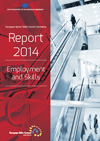
New Technologies on Skills & Occupation", looks at the impact of change on the future demands for skills. The report makes a reflection on the development of skills and expertise in the commerce sector in Europe by discussing in particular the main drivers of change and the impact of new information and communication technologies.
The aim was therefore to look at future jobs and skills by understanding the changes that marked and caused developments in the ecosystem of commerce as well as the impacts on employment, occupations and skills. The approach is a comparative and Community one carried out on the basis of in-depth interviews in several European countries.
The report concludes that:
- The analysis of the drivers of change and more specifically the impact of new information and communications technologies shall not to be overestimated;
- The need, on the one hand, to balance the supply and demand for skills, and on the other hand to secure career paths for people, requires a treatment of these issues in advance, that is to say, in time, using structures that encourage a prospective analysis of jobs and skills. Employment Observatories or similar organizations established in EU Member States meet this need.
- Interviews with these observatories have nevertheless shown their fragility as some are subject to austerity measures in a crisis situation, and are driven either to disappear or to be reorganised.
- The analysis of practical training and skill certifications in the commerce sector shows that the company is the most appropriate level to receive qualifications and that the experience gained is a guarantee of authentic "know-how" and "skills"
- But to appeal to and especially to meet the skills needs of this sector, the negative image of the sector has to be changed. This bad image refers to that of a precarious instability in employment. Although wages are higher in the wholesale sector, the retail sector is often too far away from the individuals to accommodate the steps of jobseekers.
The effective ability of the European institutions to support national initiatives in the anticipation of skills needs in the different sectors in the face of national measures of austerity is crucial. This is even more so as the businesses in this sector are not all on the same footing. While large companies have the means to observe and anticipate job needs, SMEs often lack the means and often need to rely on territorial or sectoral observatories to take strategic decisions. The territorial dimension should not be ignored in this regard in the forward-looking management of skills.




 This website has been funded with support from the European Commission. It reflects the views only of the author, and the Commission cannot be held responsible for any use which may be made of the information contained therein.
This website has been funded with support from the European Commission. It reflects the views only of the author, and the Commission cannot be held responsible for any use which may be made of the information contained therein.